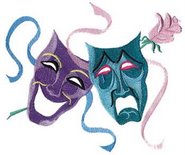I believe that all you are is always enough. It is a concept that not only affects my personal life, but my professional life as well. It is the reason I am the person I have grown to be and the reason I want to be an actress. However, my brother was the first to give me this advice. Having grown up in a small suburb, my family was the only of Greek Orthodox descent in the entire county. It was not merely that we were different from the rest of suburbia, but that we
 stuck out. I think that most teenagers are already self-conscious and eager to fit in with their peers. Therefore when a cultural gap actually exists the problem is magnified.
stuck out. I think that most teenagers are already self-conscious and eager to fit in with their peers. Therefore when a cultural gap actually exists the problem is magnified.For me this manifested itself through my attempts to look and be like everyone else. I joined clubs, played sports and even dyed my hair. Among teens and pre-teens it is becoming less acceptable to be an individual; those who do stand out often become targets for ridicule and bullying. Speaking from my own experience, I felt there was a “right way” and a “wrong way” to be and in order to be “right” I should follow the lead of my friends. With this idea in mind, I quit the local theatre I had performed at for many years despite the fact that I enjoyed my time there and loved performing. To my surprise, my brother was the one who came to me upset after hearing about my resignation. He is five years my senior and I had always looked up to him. As he had always been a bit of a jock, I assumed he viewed my interaction in the theatre the same way my friends had. Having witnessed the changes in my behavior and appearance, he decided he needed to speak with me. After gathering why I felt the need to change into someone different, he told me that as people, all we are is always enough. The things that make me different from others are not necessarily wrong, and I should never be ashamed of the person I am or the things that interest me. If everyone were meant to be identical, there would be no point to living. He sited my favorite musician, Davey Havok of AFI seen in concert above as an example. In comparison to other punk bands AFI sounds similar, but their live shows set them apart from any other band currently touring.
This lesson took many years for me to understand and embrace, but today
 it is the one core belief I take with me at all times. Never was this concept more important than when I decided to major in theatre arts at college. I found that many of my friends and neighbors viewed the theatre as not being a legitimate career or a worthy ambition, but the advice my brother had given remained with me. The reality of the entertainment world is that it is a business that encourages individuality. There are many examples of actors and musicians who have achieved success because they embraced their differences rather than stifle them. Actress, Nia Vardalos seen at the top right at the 2003 Academy Awards where she was nominated for her performance in My Big Fat Greek Wedding. A film she wrote based on her life growing up as a Greek American. The success of the film hinged on the experiences of a person outside of the "norm." Furthermore, as a fellow Greek American I personally can identify with the cultural gaps discussed in the film. In truth the reason the film did so well is because on some level everyone understands what it feels like to be the odd man out, only most hide it if possible. Fortunately for me I can't hide my cultural individuality, though I used to think it was unfortunate. We are what we are for a reason, and to fight is useless. Having embraced the person I am has taught me that all I am will always be enough.
it is the one core belief I take with me at all times. Never was this concept more important than when I decided to major in theatre arts at college. I found that many of my friends and neighbors viewed the theatre as not being a legitimate career or a worthy ambition, but the advice my brother had given remained with me. The reality of the entertainment world is that it is a business that encourages individuality. There are many examples of actors and musicians who have achieved success because they embraced their differences rather than stifle them. Actress, Nia Vardalos seen at the top right at the 2003 Academy Awards where she was nominated for her performance in My Big Fat Greek Wedding. A film she wrote based on her life growing up as a Greek American. The success of the film hinged on the experiences of a person outside of the "norm." Furthermore, as a fellow Greek American I personally can identify with the cultural gaps discussed in the film. In truth the reason the film did so well is because on some level everyone understands what it feels like to be the odd man out, only most hide it if possible. Fortunately for me I can't hide my cultural individuality, though I used to think it was unfortunate. We are what we are for a reason, and to fight is useless. Having embraced the person I am has taught me that all I am will always be enough.




